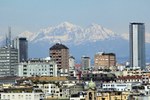News
Point of view: who will fill the macro-regional Alpine house with life?
Jan 29, 2014
/
alpMedia
Just as in the building of a house, the inhabitants are the most important persons involved in the Alpine macro-region. But, eight weeks after the start of the process, states and regions have yet to indicate to the representatives of civil society whether they may contribute. R.S.V.P.
Eight NGOs and networks in the Alps, including CIPRA, share one vision: the macro-region as a house for the Alpine space that offers its inhabitants a good quality of life and respectfully blends in with nature. The ecological materials from which it is constructed all come from the region. It is easy to reach by public transport and its denizens know that they must use energy efficiently. The decision in principle for the building of this "House for the Alpine Space" was taken on 19 December 2013 at the meeting of the European Council, which issued the order for the European Commission to draw up a macro-regional strategy for the Alps. The idea is for the strategy to be implemented from mid-2015. Building a house requires engineers, architects and craftsmen and women. It is however not such a good idea that the inhabitants - i.e. civil society - should be consulted only when the house is due to be handed over.
Every house needs a plan for its construction: how big should it be, how will the rooms be used? Engineers and architects - the EU, the member states and the regions - can hardly decide on such matters if they are unaware of the needs of the inhabitants. The actual building process requires craftsmen and women, i.e. the administrative authorities. Foundations are laid, walls erected, fixtures and fittings installed. The inhabitants follow the progress of the construction works and repay the efforts of the engineers, architects and craftspeople at the topping-out ceremony with plentiful supplies of food and drink. They feel good and will consequently fill the House for the Alps with life. That will also make the engineers, architects and craftspeople happy.
Of course it is not possible for the Alpine states and regions to involve every inhabitant of the Alps in the development of a macro-regional strategy. Consultation late in the day, as some are demanding, is however not enough. The eight NGOs and networks - CIPRA International, ISCAR, the "Alliance in the Alps", CAA, the "Alpine Town of the Year", WWF, proMONT-BLANC and IUCN - are ready to offer help and assistance for the macro-regional strategy as competent go-betweens. They can transfer their network experiences from the Alps to Europe and form a link with people and places in the Alps. But that means that they must from the outset take part in developing the European strategy for the Alpine space. If the foundation stone is laid and only the colour of the kitchen walls is up for discussion, it will be too late. R.S.V.P.
Further information: www.cipra.org/en/press/press-releases
Every house needs a plan for its construction: how big should it be, how will the rooms be used? Engineers and architects - the EU, the member states and the regions - can hardly decide on such matters if they are unaware of the needs of the inhabitants. The actual building process requires craftsmen and women, i.e. the administrative authorities. Foundations are laid, walls erected, fixtures and fittings installed. The inhabitants follow the progress of the construction works and repay the efforts of the engineers, architects and craftspeople at the topping-out ceremony with plentiful supplies of food and drink. They feel good and will consequently fill the House for the Alps with life. That will also make the engineers, architects and craftspeople happy.
Of course it is not possible for the Alpine states and regions to involve every inhabitant of the Alps in the development of a macro-regional strategy. Consultation late in the day, as some are demanding, is however not enough. The eight NGOs and networks - CIPRA International, ISCAR, the "Alliance in the Alps", CAA, the "Alpine Town of the Year", WWF, proMONT-BLANC and IUCN - are ready to offer help and assistance for the macro-regional strategy as competent go-betweens. They can transfer their network experiences from the Alps to Europe and form a link with people and places in the Alps. But that means that they must from the outset take part in developing the European strategy for the Alpine space. If the foundation stone is laid and only the colour of the kitchen walls is up for discussion, it will be too late. R.S.V.P.
Further information: www.cipra.org/en/press/press-releases






